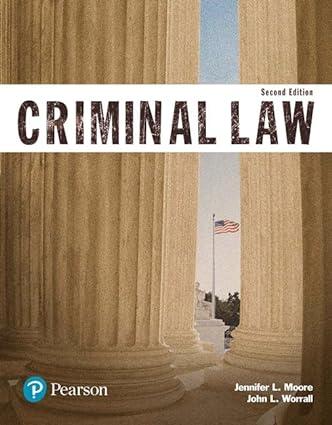On the evening of August 26, 1981 in Shreveport, Tony Duke gave the defendant, Brian Chism, a
Question:
On the evening of August 26, 1981 in Shreveport, Tony Duke gave the defendant, Brian Chism, a ride in his automobile. Brian Chism was impersonating a female, and Duke was apparently unaware of Chism’s disguise. After a brief visit at a friend’s house the two stopped to pick up some beer at the residence of Chism’s grandmother. Chism’s one legged uncle, Ira Lloyd, joined them, and the three continued on their way, drinking as Duke drove the automobile. When Duke expressed a desire to have sexual relations with Chism, Lloyd announced that he wanted to find his ex-wife Gloria for the same purpose. Shortly after midnight, the trio arrived at the St. Vincent Avenue Church of Christ and persuaded Gloria Lloyd to come outside. As Ira Lloyd stood outside the car attempting to persuade Gloria to come with them, Chism and Duke hugged and kissed on the front seat as Duke sat behind the steering wheel.
Gloria and Ira Lloyd got into an argument, and Ira stabbed Gloria with a knife several times in the stomach and once in the neck. Gloria’s shouts attracted the attention of two neighbors, who unsuccessfully tried to prevent Ira from pushing Gloria into the front seat of the car alongside Chism and Duke. Ira Lloyd climbed into the front seat also, and Duke drove off. One of the bystanders testified that she could not be sure but she thought she saw Brian’s foot on the accelerator as the car left. Lloyd ordered Duke to drive to Willow Point, near Cross Lake.
When they arrived Chism and Duke, under Lloyd’s direction, removed Gloria from the vehicle and placed her on some high grass on the side of the roadway, near a wood line. Ira was unable to help the two because his wooden leg had come off.
Afterwards, as Lloyd requested, the two drove off, leaving Gloria with him.
There was no evidence that Chism or Duke protested, resisted or attempted to avoid the actions which Lloyd ordered them to take. Although Lloyd was armed with a knife, there was no evidence that he threatened either of his companions with harm. Duke proceeded to drop Chism off at a friend’s house, where he changed to male clothing. He placed the blood-stained women’s clothes in a trash bin. Afterward, Chism went with his mother to the police station at 1:15 a.m. He gave the police a complete statement, and took the officers to the place where Gloria had been left with Ira Lloyd. The police found Gloria’s body in some tall grass several feet from that spot. An autopsy indicated that stab wounds had caused her death. Chism’s discarded clothing disappeared before the police arrived at the trash bin.
. . . Defendant appealed from his conviction and sentence and argues that the evidence was not sufficient to support the judgment. Consequently, in reviewing the defendant’s assigned error, we must determine whether, after viewing the evidence in the light most favorable to the prosecution, any rational trier of fact could have found beyond a reasonable doubt that
(a) a completed felony had been committed by Ira Lloyd before Brian Chism rendered him the assistance described below;
(b) Chism knew or had reasonable grounds to know of the commission of the felony by Lloyd, and
(c) Chism gave aid to Lloyd personally under circumstances that indicate either that he actively desired that the felon avoid or escape arrest, trial conviction, or punishment or that he believed that one of these consequences was substantially certain to result from his assistance . . .
Questions:
1. Specifically, what crime did the State of Louisiana charge Brian Chism with?
2. List all of the facts that support Chism’s conviction as an accessory after the fact?
3. Could Chism have alleged any type of legal defense to his charge? Why or why not?
Step by Step Answer:






